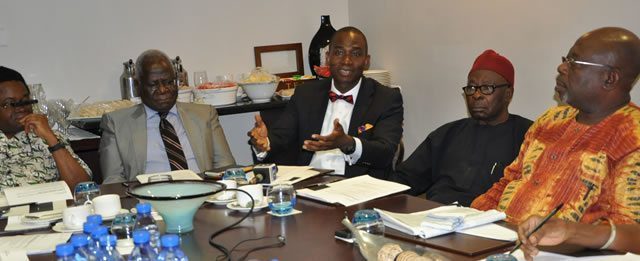![]()
![]()
![]()
![]()
![]()
![]()


The long list for the $ 100,000 Nigeria Prize for Literature throws up some of the country’s resourceful poets, AKEEM LASISI writes Who wins the $ 100,000 Nigeria Prize for Literature this year? It is not too early to ask this question, as the judges of the prize, established by the Nigeria LNG, have released a long list of 10 collections of poems. And based on the calibre of many of the poets involved, it may not sound alarmist to say that the judges have a tricky and, indeed, daunting job on their hands. Already, the judges – Profs. Romanus Egudu, Molara Ogundipe and Dr. Andrew Aba – noted on Monday that the long list emerged after three months of “intensive work”. While there are a few surprises, especially in terms of the number of emerging or first-time authors making the list, many of the writers in what looks like the semi-final stage can be described as possible winners any day – based on their antecedents and the quality of their poetic crafts. For one, stakeholders who have been following the prize since inception about eight years ago will feel bold to say that, this time, the judges have no place to hide, bearing in mind what happened four years ago when the then jury found none of the works on the long list good enough to be anointed as the winner. But does a position like this not sound too optimistic or arrogant? Well, the next one month or so will tell. On the list are seasoned writers such as Femi Osofisan, in the competition with his Seven Stations up the Stairways; Remi Raji (Sea of Mind) and Afam Akeh (Letter Home and Biafran Nights). So also are Obi Nwakanma (Birthcry), Amu Nnadi (Through the Window of a Sandcastle); Amatoritsero Ede (Globe Trotter and Hitler’s Children); Ogochukwu Promise (Wild Letters); Tade Ipadeola (Sahara Testaments); Egbewo Gbebinyo (Marsh Boy and Other Poems); Obari Gomba (Length of Eyes); and Lagos-based performance poet, Iquo Eke (Symphony of Becoming). For Osofisan, it is an adventure on a familiar terrain. About five years ago, he nearly won the prize when his play, Queen Amina, got to the final stage. The crest, however, eventually went to Ahmed Yerima, whose play, The Hard Ground, which focuses on the Niger Delta crisis, carried the day. Although renowned for his exploits in drama, many people believe that Osofisan is also a fine poet. His usual experimentation with oral poetry is one of his strengths, while the mere fact that he is in the race shows that Nigeria’s writers are still very active in the muse business. Afam Akeh? Although US-based Akeh has been largely absent from the terrain in recent years, his old collection of poems, Stolen Moments, is regarded as one of the finest contributions to the poetic legacy in the country. So, although this correspondent has not read his entry for the Nigeria Literature Prize, the possibility of the old wine still being tasty indicates that he is one of the candidates to watch. But he and journalist-turned academic, Nwankanma and Ede, occupy another symbolic position on the long list. They are based abroad, and are, arguably, at an advantage since publishing infrastructure is believed to be better outside there. Beyond such a sentiment, however, Nwankanma is also a respected poet who can go further in the duel. The Head of Department of English at the University of Ibadan, Raji, has also distinguished himself as a poet. Since his award-winning Harvest of Laughters was published some 10 years ago, he has been producing works that, many critics believe, have characters. And Raji also not a new face on the NLNG literary feast. When Amu Nnandi speaks in poetry, those who have ears for the art can hardly fail to listen. This is the experience that many have with his works, with one of his biggest fans being the late Lynn Chukwura, a former judge of the Association of Nigerian Authors. Chukwura noted that Nnadi’s style was usually unique. Depending on what he has produced this time, he may also be destined for the next stage of the competition. If winners do not quit, and quitters do not win, then Promise has a bright hope in the competition. The woman reputed for having won almost all other awards in the country also once cruised to the final stage of the Nigeria Literary Prize. Now that she is back in the ring, she may have upped her game for the ultimate trophy. But there is something very interesting about the Nigeria Prize for Literature: it is not about what you had written before, or the awards you have won, but the quality and beauty of the particular work you entered for the competition. That is how the likes of Ipadeola, Ede, Gomba and Gbebinyo have the sky wide enough for them to fly into victory. While some of them have also proved their worth at different times, the textures of what they have submitted is what the judges are going to concern themselves with, based on the criteria they have designed. That is how the competition has, on some occasions, got the likes of Kaine Agari and Adeleke Adeyemi crowned. In other words, the fact that the younger faces on the list represent a generational question shows that they are not there for fun. And for Eke, her journey, so far in the game, is a plus for poetry performers – and a lesson that, as Odia Ofeimun would say – a performing poet can also do well on paper. Meanwhile, winner of last year’s edition of the prize, Chika Unigwe, has congratulated the nominees on the journey so far. She said in a Facebook post, “Congratulations to all the fine poets (and my friends) on the NLNG long list.” |


